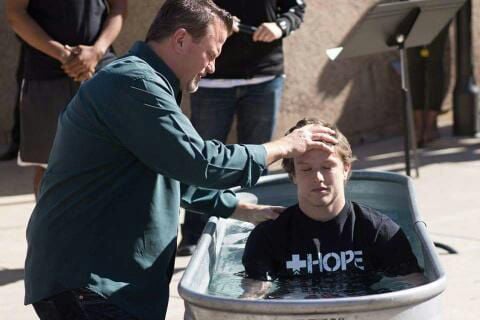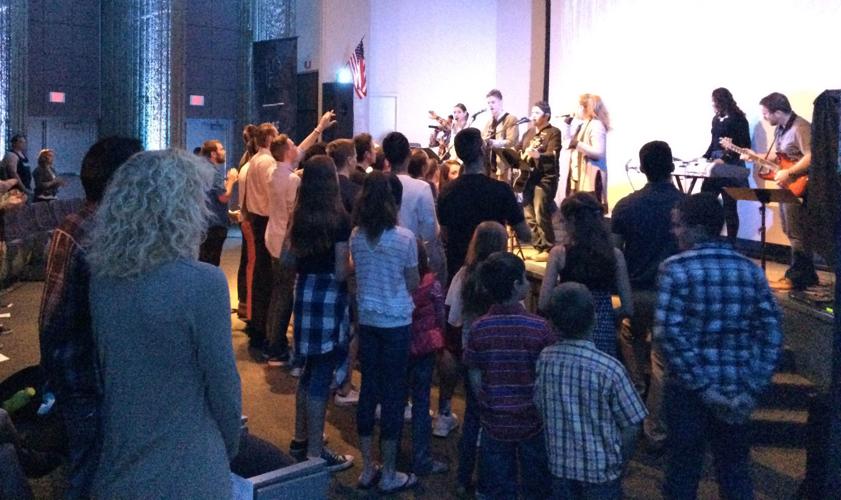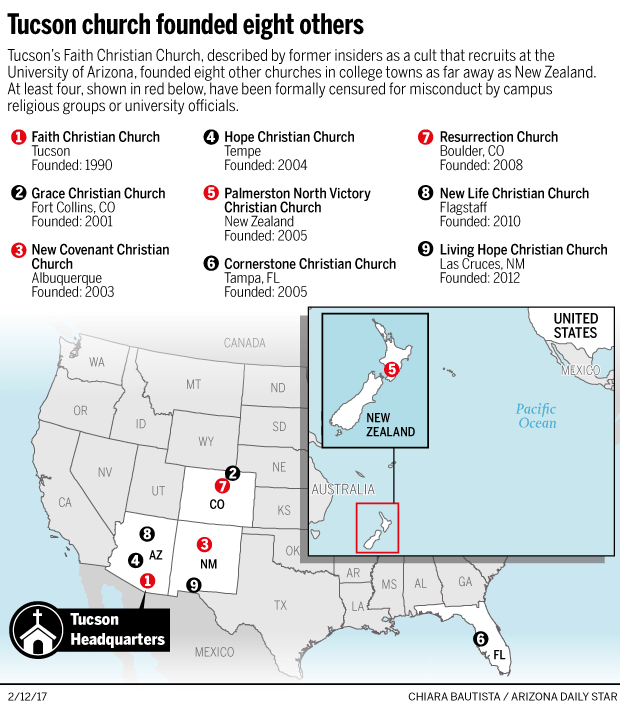A Tempe church that sprang from a controversial campus ministry in Tucson is under investigation by Arizona State University, accused of stalking, hazing and other misconduct.
Seven disciplinary charges are pending against Hope Christian Church for suspected violations of the state university system’s student code of conduct, public records obtained by the Arizona Daily Star show.
The allegations include hazing — described as “acts of mental harm, personal degradation and embarrassment” — stalking, unauthorized entry to student housing, unauthorized use of student information, and discrimination based on gender or sexual orientation.
Five campus clubs that partner with the church also face misconduct charges.
ASU started investigating after 14 people, including eight current students and an alumnus from Tucson, filed a 123-page complaint against the church in July. The university launched formal misconduct proceedings in November after reviewing the allegations, records show.
Public records also show that Hope, which takes in more than $1 million a year in donations, has received hundreds of thousands of dollars in free rent from taxpayers since 2008. The church holds its services on campus in facilities one of its student clubs is allowed to book at no cost. (See related story.)
Church officials dispute allegations of wrongdoing and say they are cooperating with the university’s investigation. A pastor working with Hope Christian says the church hired a third-party mediator in July and has been asking former members to meet with leaders to try to sort out their differences.
ASU “has yet to hear our side of the story, and we look forward to working with them to make sure they have all the facts,” said Corey Vale, chairman of the church’s board of directors.
“We’re confident that ASU will be able to determine which student complaints, if any, need to be addressed and which complaints are simply an attempt from outside detractors to promote religious discrimination and intolerance through bullying and hate speech,” he said.
Vale and other church leaders maintain the ASU complaint was manufactured by a former Hope employee who has raised concerns about the church on social media. Students say they wrote the complaint themselves and didn’t find out until they were nearly done that an ex-employee shared their concerns.
Church officials haven’t seen the complaint, but ASU officials briefed them on its content. The Star received a copy from a complainant on the condition that names of students — whose identities are protected by federal law — would not be disclosed without their consent.
It isn’t clear how long the investigation will take. The staff in ASU’s Dean of Students Office did not respond to three requests copied to four employees over a three-week period.
ASU’s online rulebook for disciplinary cases says the dean uses a “more likely than not” standard of evidence to determine if misconduct occurred, and if so, whether sanctions are warranted.
The church and its clubs could lose access to campus if the charges are upheld.
“BONA FIDE CULT”
The student complaint calls Hope a “bona fide cult” that showers new recruits with attention and affection — a tactic known as “love-bombing” — and then uses twisted Bible quotes and psychological manipulation to keep them in line.
It says the church uses five ASU student clubs as “front groups” to solicit new members.
Church leaders and supporters reject such claims.
Hope advisory board member Gary Kinnaman, a former megachurch pastor in the Phoenix area, said Hope’s leaders had authoritarian tendencies when the church was founded in 2004. Since then, Kinnaman said, he and other pastors have been helping Hope create a “kinder, gentler ministry.”
“Has Hope been controlling? Yes. Extremely controlling? Perhaps in some cases,” said Kinnaman, who now runs a religious consulting firm and is an occasional guest preacher at the church. “However, Hope’s board and advisers have recognized this tendency, have addressed it formally, have outlined changes Hope needs to make, and Hope has made those changes.”
Kinnaman helped set up a Phoenix-area support group for evangelical pastors, known as the Grace Association, whose leaders have been working with Hope almost since its founding to help the church adopt healthy practices. He and other Grace pastors appear regularly in Hope advertisements praising the Tempe church and its leadership.
Hope’s critics say the outside pastors are seldom on site and don’t see what goes on day-to-day.
FIVE COMPLAINTS
IN SIX YEARS
The current complaint against Hope is the fifth to ASU officials since 2010, public records show.
In April 2013, the father of a freshman wrote to ASU President Michael Crow saying his son was “in danger of hurting himself” because of “brainwashing” by the church.
“Because of what they have done to him, he is a shell of the individual I sent there,” wrote the father, whose name, along with his son’s, was redacted in the email ASU released to the Star.
“When I dropped him off at school last August, I had but one request — to be happy,” the father wrote. “During a 62-minute call with him yesterday, he did nothing but cry.”
ASU officials looked into the complaint but didn’t pursue it formally because father and son both objected to sharing it with the church, records show. The son defended the church when contacted by school officials, said ASU spokeswoman Herminia Rincon.
A few months later, the father wrote to Crow again. “I have no choice but to remove my son from your campus,” he said.
In another 2013 complaint, residents of a dorm on ASU’s downtown campus reported being badgered for their contact information by a “cult-like” group. Hope campus minister Sean Hamby, who is still with the church, was part of that group, an incident report by dorm personnel said.
Students who gave out their cell numbers said they were “constantly bombarded with texts” to a point it seemed “harassing and intimidating,” the report said.
Two other complaints of “harassment by a religious solicitor” were filed in 2010 by dorm residents at ASU’s Barrett Honors College. Both involved former Hope staffer Chad Pentecost, who worked for the church from 2010 to 2016, according to his Facebook timeline.
Pentecost wandered the dorm halls unescorted — in violation of university rules — and banged on doors to invite students to church-related events, the incident reports said.
Questioned by dorm personnel during one incident, Pentecost “did not seem to understand how his actions have repeatedly made residents feel unsafe,” one of the reports said.
The current ASU complaint cites six similar incidents, including cases where Hope ministers entered dorm rooms uninvited. Two of the current misconduct charges against the church and related clubs are for “non-compliance with university housing policies” and for “entering student residential rooms without permission.”
In an interview, Hope executive pastor Ricky Rudaflores disputed reports of aggressive soliciting. “We train our staff to abide by all university policies,” he said.
He provided the Star with a code of conduct and code of ethics that prohibit church employees from recruiting in residence halls. The policies also ban virtually every other form of misconduct the church is accused of.
Hope put the written rules in place June 5, which records show was two weeks after ASU alerted the church that students were preparing a formal complaint.
Rudaflores said Hope began using the rules long before there were written policies.
Dozens of ASU students report positive experiences at Hope, and their stories often are featured in church advertising.
Gila County Superior Court Judge Timothy Wright, whose daughter attends ASU and joined the church last school year, told the Star he and his wife have visited Hope a half-dozen times and came away impressed.
“We have had a chance to meet pastor Brian (Smith) and his wife, several staff members (and) other volunteers,” Wright said in an interview.
“We have full confidence that they have the students’ best interests at heart and there are no hidden agendas.”
SEXUAL PRYING
Five current Hope complainants say church leaders pressured them to confess their sexual histories. They report being questioned at length about whether they masturbated or used pornography, whether they were gay, whether they’d been molested as children and whether they’d been sexually assaulted.
An email to the Star co-written by Hope’s top three leaders and Vale, the church board chairman, denied the claims. “Pressuring people for deeply personal information is not a healthy practice, and we would not encourage anyone on our staff to act in this manner,” it said.
Hope provided the Star with records of training ASU provided to church staffers in 2015 and 2016 that covered areas such as mental health and how to help students cope with traumatic life experiences.
An ASU senior who attended Hope from 2014 to 2016 said she came to regret telling a campus minister she’d been sexually assaulted during freshman year. The minister and three other staffers later pressured her for details of her “relational sins,” including the sexual assault, the student wrote in the recent complaint to ASU.
“I was forced to relive the experience in a space I was highly uncomfortable in with people I did not want to be talking to,” she wrote. The exchange took place in a hotel room during a church trip, she wrote.
Another ASU senior who attended Hope during that time said she was “regularly forced” to recount childhood molestation. “They would tell me I was broken and that if I told them God would heal me,” she wrote in the ASU complaint.
“I was also told that being sexually assaulted at a fairly young age was a good thing because it had prevented me from engaging in intimate relationships before marriage.”
ASU alumnus C.J. Stewart, a graduate of Desert Christian High School in Tucson who attended Hope from 2005 to 2011, said Brian R. Smith of Mesa, the church’s head pastor, summoned him to a meeting in 2006 after Stewart told another minister that a man had molested him as a child. Stewart gave the Star permission to use his name.
Stewart said Smith, whom he’d never met until then, showed no empathy for his pain and “went directly to asking me about my sexual attractions, his first question being, ‘When you were in locker rooms with other boys at school, did you get erections looking at them?’”
The incident Stewart described, though a decade old, was included in the current complaint in a bid to show a long-term pattern of church misconduct.
Former ASU student Taylor Outlaw, who attended Hope in 2013 and 2014, told the Star about a sex-related seminar that made her cringe.
Hope employees showed a video on sex addiction to a mixed crowd of male and female students, then separated them by gender and pressured them to confess to the group whether they masturbated or used pornography, she said.
TUCSON ROOTS
Hope Christian Church was founded in 2004 as a satellite of Faith Christian Church in Tucson, which 20 former insiders described to the Star as a cult that has operated on the University of Arizona campus since the 1990s.
Their claims were the subject of a 2015 Star investigation that resulted in the Tucson church’s ouster from a council of campus religious leaders. The UA investigated but found no proof rules were broken, so the Tucson church continues to recruit on campus.
Cara Snyder of Tucson says her son Greg was solicited as a UA freshman last year by a Faith Christian campus minister who asked him if he thought he was going to heaven.
When Greg, now 19, started attending church activities and doing “homework” assigned by the minister, Snyder said she felt uneasy and researched the church and its leadership. She shared the Star’s previous coverage with her son and arranged for him to meet with someone who explained why Faith Christian had been kicked out of the UA’s religious council. To her relief, she said, her son’s interest in the church waned.
Faith Christian founded eight satellite churches, including the one in Tempe, that recruit university students in three other states and New Zealand. The Tucson church and three of the satellites have been censured in recent years in response to complaints from students. (See related story.)
The Tempe church still is led by several of its Tucson founders. But the two churches had a falling out in 2005 and no longer have contact, said Smith, Hope’s head pastor and primary founder. Smith, a UA fraternity leader and student council president in the 1980s, is a former member, elder and associate pastor of the Tucson church, and got his start recruiting students on the UA campus. He was trained by Faith Christian’s founder, Stephen M. Hall, who has consistently refused to comment on criticisms of his church.
Smith said he initially practiced “a similar style of leadership” to Hall, which he described as “authoritarian, controlling and legalistic.” But over the years, he said, the Tempe church has “built a new, healthy ministry culture.”
“FRONT GROUPS”
Complainants says Hope recruits members through five student activity clubs that function as “front groups” while claiming to be independent of the church.
Smith said the church supports what the five clubs do and partners with them for some student events. But there’s no “direct connection” between the clubs and the church, he said.
But internal church documents, submitted to ASU as part of the recent student complaint, show the five clubs — Sun Devils Wear Prada, Sun Devil Survivor, Outlaw Comedy, Man Up and WOW Factor — each play a key role in helping Hope attract new members.
A church website from 2013 names all five clubs as participants in Hope’s annual drive — known as Operation 72 — to befriend as many freshmen as possible within 72 hours of their arrival on campus and obtain their contact information.
Another internal document, a 2016 slide show created by Hope campus minister Trevor Pentecost, analyzed which student clubs were most successful at helping the church “make a lot of friends that actually became disciples.”
Hope’s “Respect Movement” — which encompasses student clubs Man Up and WOW Factor — and Sun Devil Survivor, a wilderness competition, did best at attracting students who went on to join the church, the slide show said.
ASU senior Stephen Wicker, a former officer with the student club Man Up and one of the main authors of the ASU complaint, said the clubs host comedy shows, fashion shows, barbecues and pool parties, but they exist to promote the church.
“These are in no way independent organizations,” said Wicker, who attended Hope from 2014 to 2016.
Student contact information acquired by any of the clubs is turned over to the church for follow-up solicitations, according to Wicker and other complainants who said they personally entered such data into Hope’s central database.
Each of the five clubs now faces formal misconduct charges for allegedly misusing student information, entering student dorms without permission and failing to follow campus housing rules, ASU records show. Four of them, all except for Outlaw Comedy, also are accused of stalking.
Phoenix-area pastor Mark Buckley, part of the group that’s been counseling Hope’s leadership for more than a decade, doesn’t buy the criticisms. From his vantage point, the church has been largely successful and members have had positive experiences.
“Our conclusions are that Hope is a good tree, bearing a lot of good fruit, that has needed some pruning,” he said, “not a bad tree that needs to be uprooted.”








